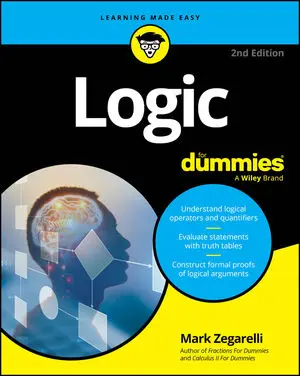Sentential logic operators, input–output tables, and implication rules
Working with sentential logic means working with a language designed to express logical arguments with precision and clarity. To make use of this language of logic, you need to know what operators to use, the input-output tables for those operators, and the implication rules.
This table introduces sentential logic operators:

The next tables offer input–output tables for sentential logic operators:

Logic helps you reach conclusions, which you do with the help of implication rules for sentential logic:

Equivalence rules for sentential logic
In any logic system, you compare statements to prove or disprove their validity. With sentential logic, you use the following equivalence rules to make those comparisons:

Identity and quantifier rules for quantifier logic
Quantifier logic encompasses the rules of sentential logic and expands upon them so that you can write whole statements with logic symbols. Those symbols come into play when you work with identities, or interchangeable constants. The rules of identity are shown here:

And, when talking about identities, you can quantify statements, using the rules in the following table:

Tips for taking a logic exam
Taking an exam in logic calls for a clear head and a clear plan. The tips in the following list can help you approach a logic exam with the best chance to prove your proficiency:
-
Start by glancing over the whole exam to get a feel for what is covered.
-
Warm up with an easy problem first.
-
Fill in truth tables column by column.
-
If you know you made a mistake, say so — you may get partial credit.
-
If time is short, finish the tedious stuff.
-
Check — and double-check — your work.





